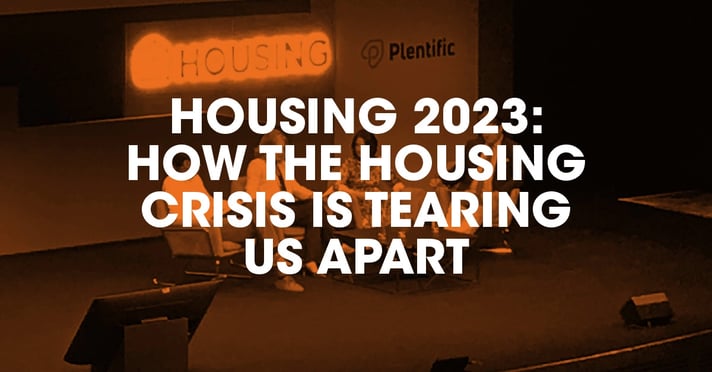Liam Halligan
Focusing on the need for expanding the UK’s housing stock, Liam pointed to the UK’s acute shortage of new homes built. “There is a huge shortage of housing – less than two million have been built in each of the last three decades, when we need more than two and a half million a decade. Only one million were built in the last decade,” he said.
Expanding on just the numbers, Liam dove into the social consequences of the current housing crisis. “Today’s young adults spent more on housing, paying expensive mortgages or renting, and they’re less likely to be home owners than any generation since the 1930’s,” he said. “Three decades ago, home ownership was a source mobility and social cohesion, and it’s now a source of social stasis and rancor.”
Liam highlighted what he described as an iron triangle the feeds the crisis, each corner of the triangle exacerbating the other. “Big developers make money out of scarcity, making fewer homes but at higher unit costs,” he said. “With 70% of loans in some way linked to property, clearing banks want prices of property high. And the existing home owners want prices to stay high.”
“Solving this issue, particularly the issue of social housing, is vital to our political and social stability and cohesion.
“And the only way we solve this issue is supply. We have a unique in the lack of supply, and any effective policy has to tackle that iron triangle to increase supply.”
In the course of his talk, Liam also mentioned the need for a focus on SMEs to be part of the mix owing to their ability to move fast and built quickly, and the need for an anti-competitive system to be shaken up, comparing the current system to an oligopoly.
Hashi Mohammed
Hashi’s comments focused less on the political conditions that have produced and perpetuated the current housing crisis.
“At the moment, with all the political instability around us, and with the public debate on housing, we are stuck on clarification on the issue of policy and law in housing,” he said. “We are 18 months away from a general election, but we don’t have clarity on the policies already in place, and we don’t have clarity on what the opposition’s plans would be.”
As a result, Hashi argues, local authorities are stalling and not producing cohesive long-term plans for the housing policies, saying: “Local authorities won’t do much, developers won’t take risks, and there’s stagnation in a fundamentally difficult way.”
Drawing this back to the social and political consequences of the crisis, Hashi focused on a sense of an unravelling social contract.
“There’s an intergenerational lack of solidarity,” he said. “You graduate with £40,000 of student debt and join an insecure workforce, for too little pay to raise a home, working longer and retiring later, and for less pension. You will be lucky to get a mortgage before 40, likely paying half of your income to rent before then.”
Hashi continued, asking: “Where’s the social contract? What are young people buying into? What gives them hope, what gives them confidence that they’re the future and will carry on the baton.”
Describing the crisis as the largest issue of or time, second only to climate change, Hashi linked the crucial need for housing to the ability for the state to provide other services, drawing on a story about the founding of the NHS.
Sangita Myska
Addressing the assembled crowd, Sangita focused on the intergeneration divide that the housing crisis is causing in society.
In particular, she focused on her own experiences as a broadcaster covering the housing crisis for LBC, a radio station that relies heavily on listener-generated content and call-in shows.
Sangita pointed out the difficulty in older generations understanding the precarious financial position of younger people.
“My older listeners say that if you can only afford a house in the good times, don’t complain when you can’t afford one in the bad times,” she said. “[Older generations] saved, why can’t anyone else? They’re proud of their common sense, no-nonsense approach to home ownership.”
But in defence of the younger generation, she points out some critical differences, saying: “Interest rates do seem lower not, closer to 6% than 15%, but differences in prices relative to income and household debt mean that 6% is closer to 20% in real terms, according to Leeds Building Society.”
“Entire swathes of people are completely cut out of home ownership by rising house prices and the rising cost of living, so they rent – 17% of households are in the social rented sector, 19% in private rentals.”
Expanding on the differences in generations, she said: “For [older homeowners], they can afford repairs to their home out of their pension, and the home may one day be passed on to their family. Yes, they worked hard to be able to do that, but for many others, they’re working hard and this is an impossible pipe dream.”
Talking about how the concept of home ownership itself has changed, Sangita said: “Homes aren’t like pensions, they are pensions for the future. They’ll be what today’s younger people sell to pay for their care later on – and those without mum and dad’s money will be selling them sooner than they expected with access to state care disappearing.”
Like the other speakers on the stage, Sangita drove home that this divide, and the difficulties in housing in general, are driving cracks in social cohesion. Particularly between younger generations that feel hard done by compared to older generations.
“My callers display fear,” she said “Fear for their health, for their security of housing, fear of never having a stable family home. And this background radiation of fear drives division between generations.”
Summary
The comments from the panel, while interesting, true and well-articulated, are now all-too familiar for those in the housing and house building industry. Last year’s topics at Housing 2023 were similar, but not so closely linked to how the housing crisis reaches beyond the economics and blurs into the social and political problems in our society.
The manifestos of the key parties for the next election will be poured over with great interest from anyone with a foot in the property world, and based on this talk should also be of immense interest to those in politics and humanities as well.


Have your say